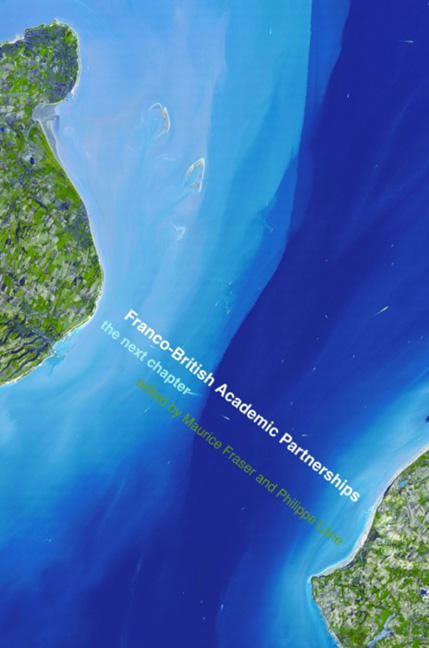Book contents
- Frontmatter
- Contents
- Notes on Contributors
- Foreword by His Excellency
- Foreword
- Preface
- Part I: Teaching and Training Partnerships
- Part II: Research Partnerships
- 12 Franco-British Academic Partnership: Perspective from Imperial College London
- 13 Sorbonne University's Franco-British Partnerships
- 14 The École Pratique des Hautes Études (EPHE), Paris: Research Collaboration Between Britain and France
- 15 International University Partnerships and the Role of the French Connection: The Experience of a London College
- 16 Maison Française d'Oxford: A Hub of Academic Cooperation for the Humanities and Social Sciences in Oxford
- 17 Multicultural London English/Multicultural Paris French
- 18 Franco-British Cooperation in the Social Sciences During a Period of Structural Reform: Current Positions and Prospects
- 19 The Publishing Industry and Research Perspectives
- Part III: Broader Perspectives
- Appendices: Addresses and Speeches at the Franco-British Academic Partnerships Seminar, French Institute, London, 5 February 2010
16 - Maison Française d'Oxford: A Hub of Academic Cooperation for the Humanities and Social Sciences in Oxford
from Part II: Research Partnerships
- Frontmatter
- Contents
- Notes on Contributors
- Foreword by His Excellency
- Foreword
- Preface
- Part I: Teaching and Training Partnerships
- Part II: Research Partnerships
- 12 Franco-British Academic Partnership: Perspective from Imperial College London
- 13 Sorbonne University's Franco-British Partnerships
- 14 The École Pratique des Hautes Études (EPHE), Paris: Research Collaboration Between Britain and France
- 15 International University Partnerships and the Role of the French Connection: The Experience of a London College
- 16 Maison Française d'Oxford: A Hub of Academic Cooperation for the Humanities and Social Sciences in Oxford
- 17 Multicultural London English/Multicultural Paris French
- 18 Franco-British Cooperation in the Social Sciences During a Period of Structural Reform: Current Positions and Prospects
- 19 The Publishing Industry and Research Perspectives
- Part III: Broader Perspectives
- Appendices: Addresses and Speeches at the Franco-British Academic Partnerships Seminar, French Institute, London, 5 February 2010
Summary
Though the Maison Française d'Oxford (MFO) is unique in the United Kingdom, it belongs to a network of 27 similar research institutes planted by France all over the world. Their main parent institution in France is the Ministry of European and Foreign Affairs (Ministère d'Affaires Etrangères et Européennes; MAEE); most institutes also receive support from the National Centre for Scientific Research (Centre National de la Recherche Scientifique, CNRS) and some work in partnership with other French specialist research institutions focusing on Asian or African area studies, archaeology or Egyptology. All institutes collaborate with local academic institutions and involve local scholars, students and support staff in their projects.
From its history, the MFO inherits four parent institutions: in addition to the MAEE and CNRS already mentioned, it works under the academic authority of the Universities of Paris and Oxford. After a brief historical survey of the MFO, we shall consider its guiding principles and then look at a few case studies illustrating our modes of cooperation with the University of Oxford, other British universities, and French research and higher education institutions.
History
At the end of the Second World War, the project of a French academic institution in Oxford, as a gift offering for the support of the British people, was promoted by archaeologist Claude Schaeffer, who had worked for the Universities of Paris and Oxford and had been an officer in the British Navy during the war. The new centre would provide a haven of French culture for English-speaking students reading French or working on French topics in Oxford. Its first Director was a former Resistance chief from the south of France, the Shakespeare scholar Henri Fluchère, who led the destinies of the MFO from its creation in 1946 to his return to France in 1962. The spirit of the nascent Maison involved conviviality, and the practice of French language and culture as its main focus. Fluchère and his helpers and friends organised visits by French artists and intellectuals, lectures, readings, concerts and cultural activities, while resident undergraduate and graduate students honed their linguistic skills in their everyday intercourse.
- Type
- Chapter
- Information
- Franco-British Academic PartnershipsThe Next Chapter, pp. 127 - 133Publisher: Liverpool University PressPrint publication year: 2011



